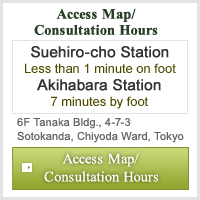2010年4月20日 « トップへ » 2010年5月20日
2010年5月17日
I am worried about facial distortion. (woman in her 30s)
Q. I feel like my face is distorted.
I tried doing facial stretches and exercises but even though it seems to get better initially, shortly after it feels like my face is distorted again. I heard that distortion is due to the way that I chew when I eat. My teeth have been weak since I was a child and now, at 38 years old, practically all of my teeth are false teeth. Could my teeth be causing my face to feel distorted?
A. It is plausible that your teeth are causing facial distortion.
As you would expect, if the position where you chew food on the right side is not aligned with the same position on the left side, you may suffer from facial distortion. If you prefer to chew in a particular area of your mouth, this may be a cause.
Your bite should be bilaterally symmetrical and should pass directly through the central axis of your body. It seems that most people who suffer from facial distortion have a poor bite alignment where the plane of the mouth is shifted to one side. The bite plane is usually hidden by the lips and the cheeks so it can be very difficult to determine bilateral symmetry. This requires an examination called face-bow transfer.
Face-bow transfer is when a mold of your upper jaw is taken and attached to a device called an actuator. This device allows us to determine whether or not your bite alignment passes vertically directly through the center of your body. Many fillings and crowns require the face-bow transfer examination technique.

You can think of the central axis of the body as being a straight vertical line extending from the top of the head to the bottom of the feet directly down the center of the body. There are a few planes on the body that are positioned symmetrically around the axis. The knees, the hips, the shoulders, and the eyes are just a few examples. It is also important for the plane of your mouth to pass symmetrically through this axis. At the same time, it is said that if your arms fall the same length on both sides, then you have good posture. With a face-bow transfer, first we take a mold of the upper jaw. After that we record the central point of the bite alignment plane and transfer the mold to a device called an actuator. Then we attach a mold of the lower jaw bite alignment to the actuator as well.

This is how we transfer recorded data to the actuator. The relationship between the center of the body (center of the actuator) and the teeth's bite alignment are reliably transferred through this process. It does not hurt at all and there is absolutely nothing to worry about.
It is necessary to conduct a face-bow transfer when examining the bite alignment plane or making crowns or dentures. There are no treatment methods at our clinic that do not require this technique. Crowns and dentures made using an actuator and face-bow transfer to guarantee perfect bilateral symmetry of the bite alignment plane allow for a balanced bite that guarantees no facial distortion. These dentures will correct your chewing habits as well by making it so that you can chew evenly throughout your mouth. Muscle tenseness will not heal immediately. But gradually your muscles will begin to relax and your face will return to normal.
You mentioned that most of your teeth are false teeth. I recommend that you have your bite alignment plane examined to see if it is lined up correctly.
What are the merits of partial dentures? (woman in her 40s)
Q. My teeth have been weak since I was in my 30s, and I have bridges connecting the molars in my upper and lower jaws. My teeth are cracking and it has reached the point where I have no choice but to get them removed. The dentist told me, "We cannot make inlays because there are no roots, so you should consider dentures." I was so shocked to hear this.
I am still in my early 40s. Do I really need to get dentures already?
I always associate dentures with the elderly. My dentist told me that it is important to have dentures if I want to continue to enjoy eating so I mustered up my courage and have decided to get a set made. But I still feel uneasy about them.
What things do I need to watch out for when wearing dentures? And please let me know if there are any merits to dentures? I would like to have a more positive view of them. Thank you.
A. By getting a reliable set of partial dentures in your 30s or 40s, you can prevent future tooth loss. People who have many crowns and are using bridges in their 30s especially need to be careful about this. There are many cases like this where peoples' teeth begin to crack and can no longer be preserved in their 40s.
If you do not get the proper dental treatment during this period, it is possible that you may actually speed up tooth loss. You must do whatever you can to make sure that all of your weaker teeth are affixed as firmly as possible. (Teeth are vulnerable to the force exerted by lateral wiggling, so it is necessary to try and prevent movement.)
It is also important to adjust your bite alignment. Also, be sure to get partial dentures that do not cause your teeth to move. These are the most important key points. The dentures we make at our clinic using the telescope system will almost completely prevent wiggling of the teeth. They actually link the teeth together extending their lifespan.
What should you be careful about when putting in dentures?
As you would expect, periodic maintenance is extremely important.
Go to the dentist to have stains that you cannot remove on your own no matter how much you brush removed professionally. It is also a good idea to have your bite alignment examined to make sure that you are exerting force throughout your whole bite and not putting extraneous force on your partial dentures. As far as merits of dentures, with the telescope system, you will not require surgery like you would with implants thus making them easier on the body.
Also, the fact that with only minor adjustments to fit the changing shape of your mouth, telescope dentures can be used for 10, 20, or more years is also a merit.
Of course our dentures are not like those covered by insurance in that the wire springs cannot be seen. There is no worry that people around you will notice that you are wearing them.
In recent years, many more patients have been choosing the telescope system over implants. Even our younger patients have been very receptive to the telescope system.
In Japan, dental treatment information from America spreads quickly, but information from Europe, and especially Germany, doesn't spread so quickly. This is likely because these procedures are more difficult. The advisor of our clinic, Dr. Shigeru Inaba, spent time as a visiting professor in Germany, and he has used this experience to import German dental technology.
It has already been 30 years since then and the results have been amazing. Therefore we wish that this technology will be spread throughout Japan.
2010年4月20日 « トップへ » 2010年5月20日









